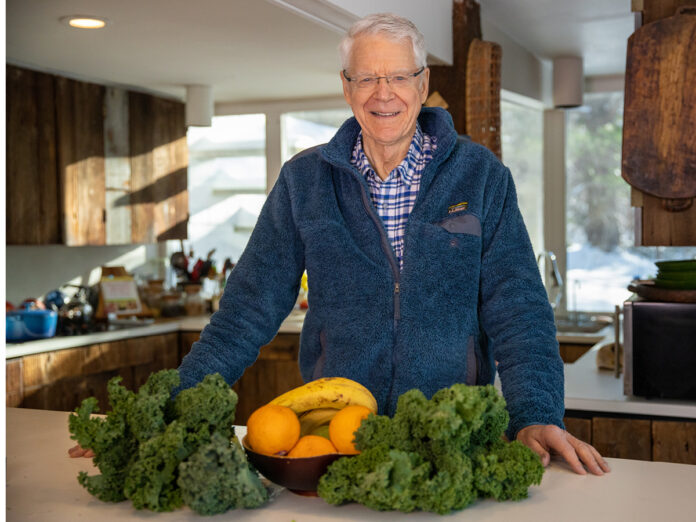
The words roll off Dr. Caldwell Esselstyn’s tongue by rote, as if he’s said them a thousand times. And he has.
Bok choy, swiss chard, kale, collard greens, beet greens, mustard greens, turnip greens, Napa cabbage, Brussels sprouts, broccoli, cauliflower, cilantro, parsley, spinach, arugula and asparagus.
A list of vegetables to some, but for the U.S.-based physician and veteran researcher in preventative cardiology, they are key ingredients in a diet he touts to prevent and even reverse cardiac disease.
“Of course, exercise is an enormous bonus, but it is worthless without nutrition,” Esselstyn says from his home in Pepper Pike, Ohio.
“You can exercise until you are blue in the face, but you are not going to protect yourself from a heart attack if you are eating oil, meat, fish, dairy and sugar.”
“It’s just not going to work,” he adds. “You can swim, jog, walk – nothing is going to trump food.”
Esselstyn, who has been healing hearts for more than three decades, says the best tools to keep the cardiovascular system and the rest of your body at its best aren’t found in a pharmacy or by going under the knife but come down to what you put in your belly.
It’s been known for years that in certain cultures, cardiovascular disease is non-existent. And lessons gleaned from those cultures underscore the power of proper nutrition – “eating food as it’s grown” – to keep hearts healthy and avoid chronic illness.
“If you try to hang out your cardiac surgical shingle in Okinawa, rural China, Central Africa, Northern Mexico, forget it, you better plan on selling pencils,” he says.
“Why don’t they have disease? Whole-food, plant-based nutrition with an essential, minimal amount of oil.” The Tarahumara Indians, for instance, eat only beans, corn and squash and they have magnificent health with no obesity and no hypertension, he says.
Experts agree that when we progressively injure the delicate, inner-most lining of blood vessels called the endothelium, heart problems begin. That’s because this lining manufactures nitric oxide which allows blood to flow smoothly in the body, prevents blockages and plaque from developing and protects against high blood pressure.
“We have never had a weapon as powerful as whole nutrition,” he says.
Unlike the typical Western diet with its processed foods, meats, oils and dairy, diets in those cultures do not injure the endothelium’s capacity to produce nitric oxide which protects against cardiovascular disease. “The good news is, this is not a malignancy. It’s a benign, foodborne illness,” Esselstyn says. “It’s really an embarrassment to think our present treatments consist of drugs and pills and stents and bypasses – all of which have not a single thing to do with causation of illness.”
Esselstyn — whose work earned accolades from former U.S. president, Bill Clinton, who underwent coronary artery bypass surgery — has seen patients who have improved their diet yield results that are, to say the least, impressive. “They have been able to not only halt disease progression but we have seen striking examples of disease reversal,” Esselstyn says.
While years of research and decades of treating patients have convinced Esselstyn of the transformative capabilities of good nutrition, he says not everyone is persuaded.
“The challenge becomes how to make the public and even physicians as well aware of the power of nutrition,” he says. “In medical school or post-graduate training [doctors] only ever get but a smattering of education on nutrition.”
Five years ago, Esselstyn was invited to become a member of the American College of Cardiology and was thrilled when he was asked to join its nutrition committee to educate cardiologists about the causation of the illness they treat. “I feel we are on the cusp of a seismic revolution in health,” he says. “It is never going to come about with an invention of another pill or a drug, procedure or operation. It will come about when we have the determination to share with the public what is the lifestyle and nutritional literacy that will empower them to absolutely annihilate chronic illness.”
So, what should you eat?
Because a meal can heal or hurt the heart, Esselstyn cautions people to choose wisely.
First, anything in a box, bag or can is likely processed and should be avoided. If the ingredients are a paragraph long, move on.
Eat your fruit, rather than drinking juice and eat whole grains, legumes, lentils, beans, red, yellow and green leafy vegetables white and sweet potatoes and fruit.
And, the doctor says, consuming oil will foil any pursuit of a diet designed to maximize health and avoid disease.
“Don’t eat oils. Not olive oil, corn oil, sunflower oil, soybean oil, palm oil, oil in a cracker, in a piece of bread nor in a salad dressing. No oil because it damages the endothelium cells,” Esselstyn says.
Don’t eat meat, eggs or dairy. That’s right, no butter, milk, cream, yogurt or cheese and ditch the sugary drinks and foods, including those with Stevia, agave and honey.
Esselstyn – who traded his own meat-eating, dairy-drinking diet for a whole-food, plant-based one in 1984 – knows it may take time to shift to a new, seemingly rigid regimen but he has seen countless patients pull it off because the results are worth it. And the alternatives, given heart disease is a leading killer of men and women in Western civilization, are not.
Esselstyn says patients are empowered when they adopt good nutrition. “Never, never, ever again are they to pass through their lips another morsel of food that is going to injure the endothelium,” he says. “How can anyone with a brain in their head say, ‘Gosh, I really enjoyed my last heart attack. I’ll destroy my last endothelial cells and have another.’”
Nix these from your grocery list
- Anything with a face (no meat, poultry, or fish)
- Dairy products
- Oils of any kind (yes, devotees of the Mediterranean diet, that includes olive oil)
- Generally, no nuts or avocados
Add this wonderful variety of delicious, nutrient-dense foods
- All vegetables. Leafy green vegetables, root vegetables, veggies that are red, green, purple, orange, and yellow and everything in between
- All legumes—beans, peas, and lentils of all varieties
- All whole grains and products, such as bread and pasta, that are made from them—as long as they do not contain added fats
- All fruits except avocado
Source – Prevent and Reverse Heart Disease, by Caldwell B. Esselstyn, Jr. M.D.
Read this story in the digital edition of IMPACT Magazine.
You May Also Like – Wiping out Heart Disease
IMPACT Magazine’s 2021 Inspiration Issue
Read about our 2021 Canada’s Top Fitness Instructors – our top 30 from across Canada! Go beyond traditional thinking to optimize movement through stretching, find out about 7 DIY hacks to improve the air quality in your home, learn about taking care of your heart through proper nutrition, enjoy some of our best plant-based recipes yet, and work out with our Canada’s Top Fitness Trainers!
















